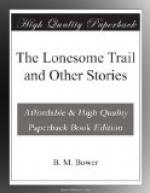“I’ll go along too,” Happy boldly retorted, “so if yuh want anything uh me, after you’ve saw Weary, yuh won’t need t’ wait till yuh strike camp t’ git it. Weary loadin’ me, was he? Yuh’ll find out, all uh yuh, that it’s him that’s loaded.”
They caught fresh horses and started—Cal, Pink, Jack Bates and Happy Jack. And Happy stood their jeers throughout the ten-mile ride with an equanimity that was new to them. For the most part he rode in silence, and grinned knowingly when they laughed too loudly at the joke Weary was playing.
“All right—maybe he is,” he flung back, once. “But he sure looks the part well enough t’ keep all Dry Lake indoors—and I never knowed Weary t’ terrorize a hull town before. And where’d he git that horse? and where’s Glory at? and why ain’t he comin’ on t’ camp t’ help you chumps giggle? Ain’t he had plenty uh time t’ foller me out and enjoy his little joke? And another thing, he was hard at it when I struck town. Now, where’d yuh get off at?”
To this argument they offered several explanations—at all of which Happy grunted in great disdain.
They clattered nonchalantly into Dry Lake, still unconvinced and still jeering at Happy Jack. The town was very quiet, even for Dry Lake. As they rounded the blacksmith shop, from where they could see the whole length of the one street which the place boasted, a yell, shrill, exultant, familiar, greeted them. A long-legged figure they knew well dashed down the street to them, a waving six-shooter in one hand, the reins held aloft in the other. His horse gave evidence of hard usage, and it was a horse none of them had ever seen before.
“It’s him, all right,” Jack Bates admitted reluctantly.
“Yip! Cowboys in town!” rang the slogan of the range land. “Come on and—wake ’em up! OO-oop-ee!” He pulled up so suddenly that his horse almost sat down in the dust, and reined in beside Pink.
They eyed him in amaze, and avoided meeting one another’s eyes. Truly, he was a strange-looking Weary. His head was bare and disheveled, his eyes bloodshot and glaring, his cheeks flushed hotly. His neck-kerchief covered his chest like a bib and he wore no coat; one shirtsleeve was rent from shoulder to cuff, telling eloquently that violent hands had sought to lay hold on him. His long legs, clad in Angora chaps, swung limp to the stirrup. By all these signs and tokens, they knew that he was drunk—–joyously, unequivocally, vociferously drunk!
Joe Meeker peered cautiously out of the window of Rusty Brown’s place when they rode up, and Cal Emmett swore aloud at sight of him. Joe Meeker was the most indefatigable male gossip for fifty miles around, and the story of Weary’s spree would spread far and fast. Worse, it would reach first of all the ears of Weary’s School-ma’am, who lived at Meeker’s.
Cal started to get down; he wanted to go in and reason with Joe Meeker. At all events, Ruby Satterlee must not hear of Weary’s defection. It was all right, maybe, for some men to make fools of themselves in this fashion; some women would look upon it with lenience. But this was different; Weary was different, and so was Ruby Satterlee. Cal meditated upon just what would the most effectually close the mouth of Joe Meeker.




